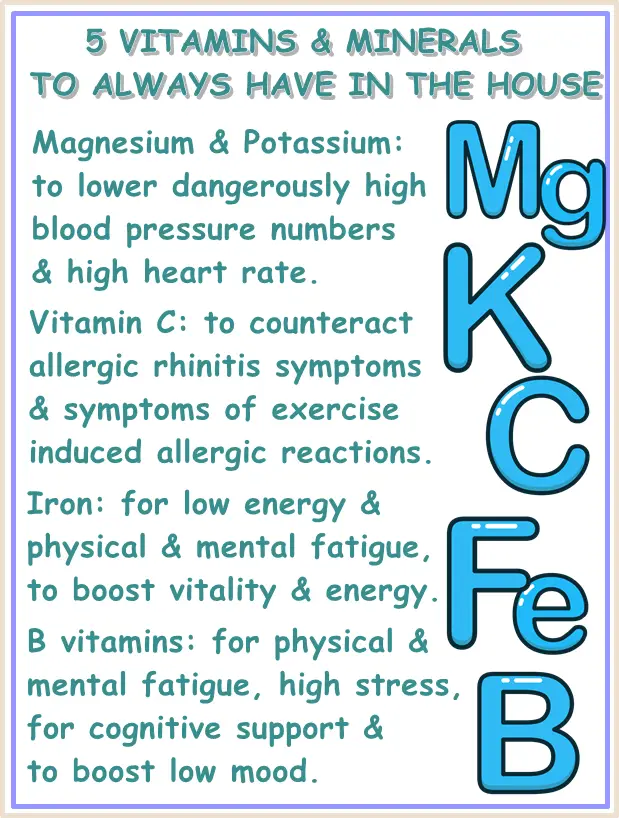Do you take dietary supplements? Do you have specific vitamins and minerals you always keep in the house or on you because they help with various symptoms or upsets? What supplements do you always rely on and make sure you have on hand at all times? Today I’m sharing my list of 5 essential dietary supplements, vitamins and minerals, that I always buy and make sure I have in the house at all times.
1) Magnesium supplements
Of all the different types of dietary supplements, magnesium supplements are at the top of my list as the best and most useful supplements to always have in the house. Even if you don’t regularly take magnesium, there are so many good reasons to keep it on hand. Despite not being actual medication, designed to work within minutes, magnesium supplements are fast-acting, with a measurable therapeutic action, and can even prevent some serious health events.

What do you take magnesium supplements for?
Magnesium is good for acute issues that need a quick resolve before they cause your state of health to deteriorate significantly. At the top of the list are high blood pressure and high heart rate. If you go through a scare or a traumatic event or receive news that destabilize you emotionally or upset you to the point your blood pressure and/or heart rate skyrocket, then you need help getting your numbers down before a cardiovascular event happens. And this is where magnesium supplements come in.
Just one dose of any type of magnesium supplement, preferably a powder formula that gets absorbed more quickly, can lower both blood pressure and heart rate numbers in a matter of minutes. Magnesium doesn’t just act on the cardiovascular system, but also on the nervous system. More specifically, magnesium induces a state of calm which is conducive to cardiovascular relaxation and that helps further bring down high blood pressure and heart rate numbers.
Taking magnesium supplements also helps with palpitations, extrasystoles and other forms of arrhythmia as well as anxiety and even sleep problems. Also read what are the top 5 reasons to keep magnesium supplements in the house, supported by scientific evidence.

Which magnesium form to take?
Experience has taught me that powder packets are fast-acting, with a measurable action which is what you want and need. As for the choice of magnesium formula, the best form of magnesium to take is the one you have on hand. All magnesium formulas produce quantifiable health effects and, while some formulas are definitely better than others, in times of need any will do.
Good magnesium forms to consider, that is, have a good therapeutic action and are accessible both price-wise and in terms of availability, are magnesium carbonate and magnesium citrate. Of course, there are many different forms of magnesium to choose from. Also read what are the best absorbed magnesium forms according to official data, with info on absorption rates and retention rates.
2) Potassium supplements
Right next to magnesium supplements in terms of importance are potassium supplements. The average adult needs to get 4700 milligrams of potassium a day for optimal health, say health authorities. It goes without saying that the majority of people do not meet their daily requirements. And potassium is extremely important for health, especially cardiovascular health.
Having potassium supplements in the house is good for instances of high blood pressure and high heart rate. Extremely high blood pressure and heart rate numbers put a person at risk for cardiovascular events such as heart attack and stroke. Taking a small-dose potassium supplement, ideally together with magnesium, can bring down blood pressure and heart rate in a matter of minutes, as well as reduce extrasystoles and help with palpitations.
3) Vitamin C supplements
Vitamin C is the kind of dietary supplement that is best taken continually.
The essential nutrient is scientifically proven to exert important antioxidant and anti-inflammatory effects, and actively support the immune system. Vitamin C is also good for seasonal allergies, helping mediate allergic rhinitis symptoms.
One way vitamin C supplementation helps with symptoms of allergic rhinitis is by reducing histamine production.
Histamine is a cell messenger that, when produced in excessive amounts, triggers immunological effects that result in symptoms of allergic reactions (e.g. inflammation and swelling, itching, airways constriction, excess nasal mucus production).
Studies show vitamin C supplementation can lower histamine levels considerably which helps improve symptoms of allergic rhinitis.
In one research paper, histamine levels were reduced by 38% following vitamin C supplementation. In another study, ‘synthetic AA (Ascorbic Acid, vitamin C) solution was found to decrease symptoms in 74% of patients’.
Just as important, vitamin C supplements can prove useful in acute situations such as exercise-induced allergic reactions.
According to research, this is because ‘vitamin C is involved in the metabolism of histamine, prostaglandins, and cysteinyl leukotrienes, all of which appear to be mediators in the pathogenesis of exercise-induced bronchoconstriction’. Supplementation with vitamin C in doses of 0.5 to 2 grams a day reduced post-exercise decline in half, as well as the ‘incidence of respiratory symptoms after short-term heavy physical stress’ and their duration.
In fact, plenty of studies have noted that ‘allergic and sensitivity reactions are frequently ameliorated and sometimes completely blocked by massive doses of ascorbate’ (source).
If you too have seasonal pollen allergies, then taking vitamin C supplements every day can prove useful for your condition, helping mediate symptoms and improve outcomes.
Recommended intakes for a measurable therapeutic action commonly start at 500 milligrams to 1 gram of vitamin C daily, and up to 2 grams. In addition to taking the supplements every day, you can also take an extra dose of vitamin C as needed, the only real side effect being loose stools. Also, for more immediate effects, the best vitamin C form to take is effervescent or powder – effervescent and powder vitamin formulas get absorbed more rapidly than tablets or pills, hence their quicker therapeutic activity.
4) Iron supplements
Another dietary supplement to always have in the house is iron. The fast rhythm of modern life paired with the demands of everyday life are draining and sources of stress leading to physical and mental fatigue. Supplementation with iron can help counteract physiological stress and associated side effects.
Iron is a co-factor for the superoxide dismutase enzyme, an antioxidant enzyme part of the innate antioxidant defense system of the body. Getting enough iron every day supports the natural antioxidant defense system of the body and helps reduce oxidative stress and prevent associated chronic diseases.
Not just this, but iron has a revitalizing action via it anti-anemia effects. Iron is needed to make new red blood cells, as well as increases the oxygen binding capacity of hemoglobin in red blood cells, increasing energy levels and restoring vitality. To boost iron absorption, take iron supplements together with vitamin C supplements.
5) High-dose B vitamins dietary supplements
B complex vitamins are vital essential nutrients of the utmost importance for good physical and mental health.
Not surprisingly, it’s common for a lot of people to reach a state of deficiency as demands for B vitamins increase in high-stress environments and instance of disease. For this reason dietary supplements often provide B vitamins in doses upward of 100% of daily recommended intakes.
B vitamins help with sleep problems and provide cognitive support, including supporting learning and memory. B vitamins are needed to cope with high levels of stress, and are directly involved in regulating energy metabolism.
Taking B vitamin supplements in high doses restores vitality and contributes to elevated energy levels whilst boosting mood and productivity.
The benefits of supplementation with high-dose B vitamins can show in as little as one week. Just as important, B vitamins are water soluble meaning the body does not retain what it does not need so you don’t risk toxicity.
High dose B vitamin supplements (100%, 150%, 200%, 300% of daily recommended intakes) are perfectly safe to use and recommended, especially considering that some B vitamins naturally have very low retention rates (e.g. vitamin B2 is eliminated in urine in 1-2 hours following ingestion).
